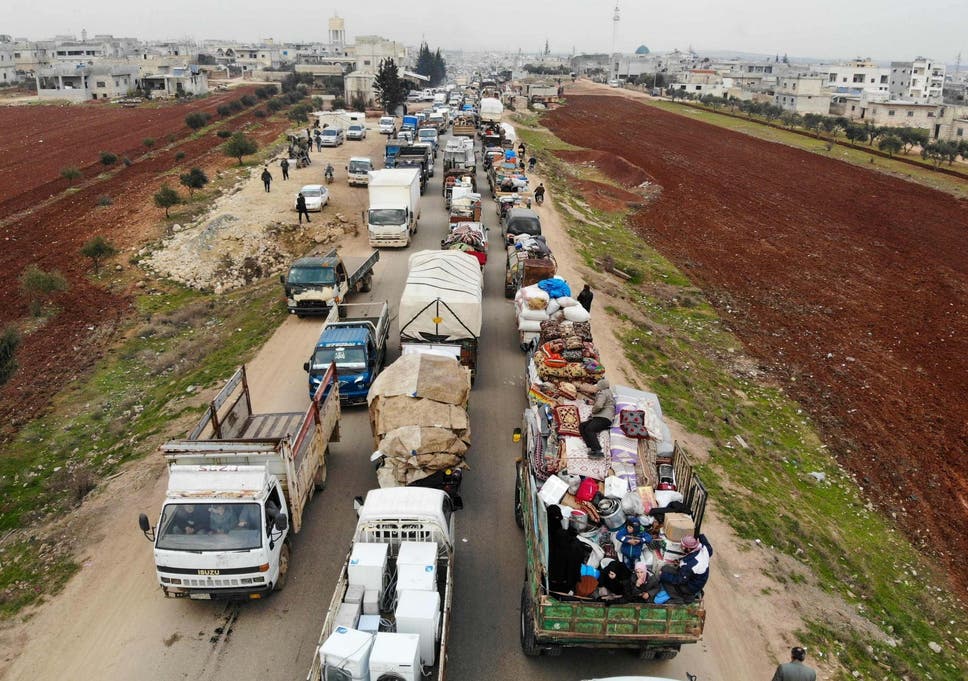
The Syrian army has captured a strategic town in the country’s last rebel-held bastion, one of a number of advances in a major offensive that has sent hundreds of thousands of civilians fleeing.
Opposition fighters largely abandoned the town of Ma’arat al-Nu’man in Idlib province late on Tuesday, following days of heavy airstrikes. The government also made gains west of the city of Aleppo, according to state media and opposition activists.
“Our armed forces continued operations in southern parts of Idlib with the aim of putting an end to crimes committed by terrorist groups,” said army spokesperson Brigadier General Ali Mayhoub, adding that more than a dozen towns and villages had been taken.
The capture of Ma’arat al-Nu’man represents an important strategic victory for the Syrian government, which has slowly regained control over most opposition-held territory with the help of its allies Russia and Iran.
The town, which had a population of about 100,000 before residents fled the fighting, sits on the main highway that links Damascus with the commercial hub of Aleppo, the reopening of which has been a goal of government forces for some time.
Syrian officials have said the link between the two cities is vital for the country’s economy, which has been devastated by the war.
The loss of the town also deals a symbolic blow to those opposing Syria’s president, Bashar al-Assad. During the country’s nearly nine-year civil war, the town has become known for its adherence to the original, democratic ideals of the Syrian uprising.
Despite pressure from both sides, residents held regular protests against both Assad’s regime and jihadi armed groups, countering the government’s characterisation of the war as a battle between a secular state and extremists.
“From 2011 until the last demonstration, people took to the squares and streets for freedom and justice,” Fared Alhor, a journalist and photographer from the town, told The Independent.
“The demonstrations were calling for the toppling of the Assad regime and Russia, but they also demanded the fall of the Hayat Tahrir al-Sham (HTS),” he said, referring to the al-Qaeda offshoot that now controls large parts of Idlib province.
On Tuesday, Mr Alhor watched with despair as Syrian government soldiers and allied Russian troops began posting videos from inside the town.
“This date will remain in my mind until death,” he said.
Elizabeth Tsurkov, a fellow at the Foreign Policy Research Institute, said the town has an “immense significance to the Syrian uprising”.
“It was the city in Idlib that witnessed some of the largest protests in the history of the revolution and it was able to resist the imposition of jihadist rule until 2019, long after many other towns in Idlib came under the control of Hayat Tahrir al-Sham,” she told The Independent.
“The town was a hub of social activism, including human-rights organisations, women empowerment groups, organisations assisting children and the displaced. This legacy of activism lives on in the minds of those who have experienced it, but Ma’arat al-Nu’man itself will now be repopulated only with Syrians who agree to be docile subjects of the Syrian regime.”
Mr Alhor left the town in May last year when Syrian government jets bombed his home, killing his aunt and injuring several family members.
Hundreds of thousands of people have made the same journey towards the Turkish border in recent months, and the United Nations has warned of the growing risk of a humanitarian catastrophe. Idlib province is home to 3 million civilians, almost half of whom were displaced from other parts of the country.
On Monday, the US secretary of state, Mike Pompeo, condemned “unjustifiable attacks against the people of northwest Syria”. He said that the US calls for an immediate ceasefire and “full access to the affected areas by humanitarian organisations to alleviate the suffering of the hundreds of thousands that have fled the incessant bombing”.
The Syrian Response Coordination Group, a relief group active in northwest Syria, reported that more than 216,000 people fled Idlib in December. In a new statement, the group said that 167,000 have left their homes since the beginning of January, bringing the total number to more than 383,000 people.
The fighting in recent days has prompted another exodus from towns near the front line. Images from the province show roads full of families crowded into cars and on the back of pickup trucks.
Meanwhile, to the north of Ma’arat al-Nu’man, government forces have moved to capture rebel-held territory in the western suburbs of Aleppo.
“It’s just bombs, bombs, bombs,” said Abdulkafi Alhamdo, a university lecturer who survived the siege of Aleppo and is now living in the west of the province, close to where fighting is taking place.
“In my village, there are still some people, but the areas closer to the fighting are almost empty,” he told The Independent by phone.
“There is no place to go now. Some of my friends said they would rather die here than live in camps. The situation is horrible. It’s unspeakable.”
Additional reporting by agencies







